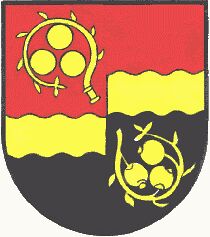Riegersberg: Difference between revisions
Jump to navigation
Jump to search
Knorrepoes (talk | contribs) m (Text replace - "Österreich" />" />" to "Österreich" />") |
Knorrepoes (talk | contribs) m (Text replace - "[[Literature" to "{{media}} [[Literature") |
||
| Line 17: | Line 17: | ||
The arms are based on those of Friedrich der Wenger, a local nobleman of the 14<sup>th</sup> century.<br> | The arms are based on those of Friedrich der Wenger, a local nobleman of the 14<sup>th</sup> century.<br> | ||
The two bars wavy refer to the Riegersbach and the Lafnitz rivers. The crosier's head and the three balls are symbols for St. Nicholas, patron saint of the church. The branch with the three apples shows the gain of diligence, the fruit of the earth. | The two bars wavy refer to the Riegersbach and the Lafnitz rivers. The crosier's head and the three balls are symbols for St. Nicholas, patron saint of the church. The branch with the three apples shows the gain of diligence, the fruit of the earth. | ||
{{media}} | |||
[[Literature]] : Image provided by Karl Palfrader (k.palfrader@aon.at), MStLA 48 (1998), p. 57 | [[Literature]] : Image provided by Karl Palfrader (k.palfrader@aon.at), MStLA 48 (1998), p. 57 | ||
Revision as of 04:23, 9 July 2014
| Heraldry of the World Civic heraldry of Austria - Österreichische Gemeindewappen |
RIEGERSBERG
State : Steiermark
District : Hartberg
Origin/meaning
The arms were granted on June 16, 1997.
The arms are based on those of Friedrich der Wenger, a local nobleman of the 14th century.
The two bars wavy refer to the Riegersbach and the Lafnitz rivers. The crosier's head and the three balls are symbols for St. Nicholas, patron saint of the church. The branch with the three apples shows the gain of diligence, the fruit of the earth.
Contact and Support
Partners:
Your logo here ?
Contact us
© since 1995, Heraldry of the World, Ralf Hartemink 
Index of the site
Literature : Image provided by Karl Palfrader (k.palfrader@aon.at), MStLA 48 (1998), p. 57











